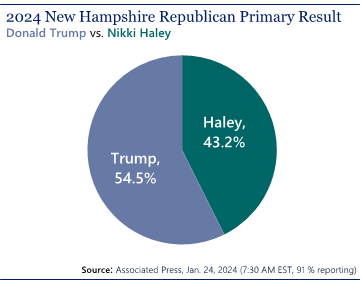Overview
The US elections carry immense significance as the nation grapples with deep and persistent divisions. An unpopular incumbent is seeking reelection against a likely opponent who is facing 91 felony counts in four separate criminal cases. Dysfunction in Congress has sidelined efforts to address the mounting domestic and global challenges facing the country. Meanwhile, wars raging in Europe and the Middle East, together with the tensions between the US and China, pose an increasing geopolitical and economic challenge.
Today’s politics remain defined by a prolonged and pervasive malaise among most of the country; January 2004 was the last time that a plurality of voters believed that the country was headed in the right direction, according to polling conducted by NBC since the early 1990s. In RealClearPolitics' recent polling average, 68% of voters currently believe that the country is headed in the wrong direction. As a result, there is broad alienation toward both political parties with a record number of Americans now identifying themselves as political independents.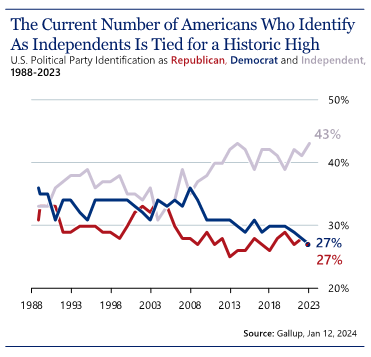
Businesses should expect an even more volatile environment following the November elections because the ongoing shift toward populism by both parties means they can’t count on the support they historically received from most Republicans and many centrist Democrats.
A November 2023 NBC poll underscores the discontent the American public feels about business: Forty-four percent of respondents were very dissatisfied with the size and influence of major corporations, compared to 5% who are very satisfied – an all-time low in the outlet’s polling on the issue.
Companies should have a strategy in place to navigate the complex political environment of the 2024 election and prepare for the likely troubling aftermath.
The 2024 Presidential Campaign
Trump and the Republicans
While Haley remains Trump’s main competitor after committing to stay in the race in her concession speech following her defeat in New Hampshire, her path to the nomination seems uphill at best. Florida Governor Ron DeSantis' decision to exit the primary race and endorse Trump, along with South Carolina Senator Tim Scott's endorsement of Trump over his former governor, has provided the former president additional momentum as his party increasingly unites around him as the presumptive nominee.
Haley’s performance in New Hampshire demonstrated Trump’s relative weakness among his party’s more moderate wing, as well as with independent voters, but she will have to win over a far more conservative group of voters who more strongly support Trump in her home state of South Carolina’s Republican presidential primary on February 24. With that contest being quickly followed by Super Tuesday on March 5, when the largest number of US states hold primary elections, Trump is the prohibitive favorite to deliver an early knockout blow.
In effect, Trump spent the last year “campaigning” from courthouses as an outsider battling the establishment. What ordinarily might have cursed a more traditional candidate worked to his advantage – the criminal and civil cases drew enormous press attention and turned Trump into a victim in the eyes of most Republicans.
The Republican nominee in 2016 and 2020 likely will be the 2024 nominee as well. While some of Trump’s GOP critics argue that a conviction in one or more of the trials would put his nomination in jeopardy, the probability is very low that any verdicts would be delivered before election day on November 5.
Two Factors to Watch
- Evolving ideological tension within the Republican Party. While broadly united on immigration and taxes, there are evolving fault lines on foreign policy, government spending and the party’s tone on social issues. Haley’s support for Ukraine places her in the minority camp of her party, she has been sharply critical of the former president’s spending and debt policies, and she speaks about social issues with less divisive language – all positions broadly endorsed by the traditional Republican establishment but not embraced by the larger, working-class-dominated wing of the party energized by Trump’s candidacies over the last decade.
- Perceptions of Trump’s legal challenges among general election voters who aren’t reflexively in his corner. Republicans acknowledge the risks posed by Trump’s legal troubles but see President Biden as a deeply flawed candidate whose age and economic record make him vulnerable. And if Biden were to step down, the GOP sees Vice President Kamala Harris as the likely successor to lead the ticket and considers her an even weaker opponent.
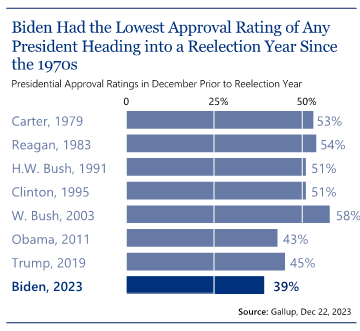
Biden and the Democrats
Given the current mood in the country, it should come as no surprise that Biden had only a 39% job-approval rating at the end of 2023. In fact, he has the lowest job approval of any president going back to the 1970s as he begins his fourth year in office. Biden gets particularly low marks in his handling of the economy as well as on crime and immigration – issues top of mind for crucial swing voters.
Despite tepid support within the party, Biden faces only token opposition on his path to reelection. The president has suffered significant erosion of support from some of his strongest supporters, including young people and people of color. He has also performed poorly with moderate and independent voters who were key to his victory over Trump in 2020.
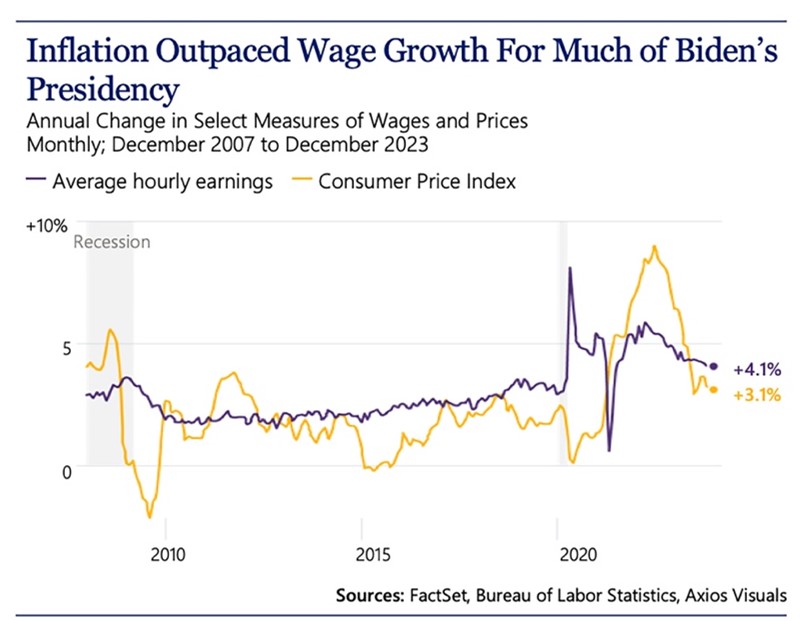
A Look Ahead To November
The basic contours of the presidential race have changed even in the past 90 days: Beyond now holding a lead in national polling, Trump is clearly outperforming Biden in four of the six swing states – Arizona, Georgia, Michigan and Nevada. The impact of third-party candidates at this juncture in the race remains unclear, but their role in the election will be a point of analysis in commentary in the months to come.
High inflation for the past two-and-a-half years (even if it has eased of late) has no doubt led to a significant drop in support for Biden, with prices having increased on average by 19% since 2019. While wages have gone up during this time, they have not until recently kept pace with the rate of inflation.
Nowhere has the rising rate of inflation been more impactful than in the cost of buying food: A basket of groceries that cost $100 in 2019 now totals over $125.
There are some signs that the mood has begun to brighten, however, with the University of Michigan’s index of consumer sentiment surging by a near-historic 28% since November. Both the S&P 500 and Dow industrials have also set new highs in recent days and retail spending in December exceeded expectations.
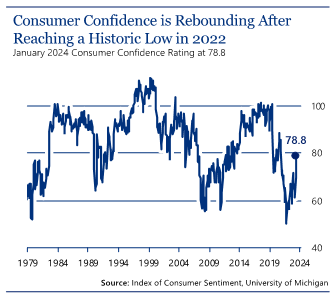
APPENDIX
The 2024 Electoral College Map
Biden will likely begin the general election favored to win 226 electoral votes compared to 235 for Trump. The remaining six states (Arizona, Georgia, Michigan, Nevada, Pennsylvania and Wisconsin) with 77 electoral votes once again will likely determine which candidate wins the 270 electoral votes required to win the White House.
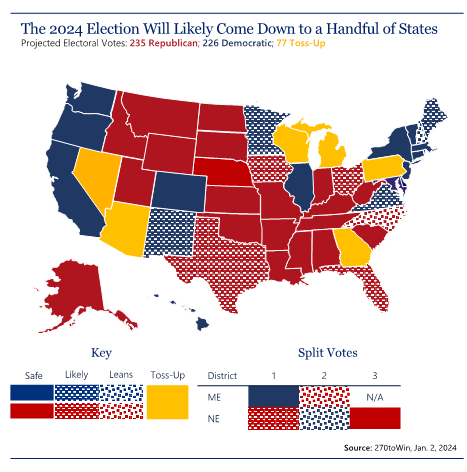
Notable Election-Related Dates
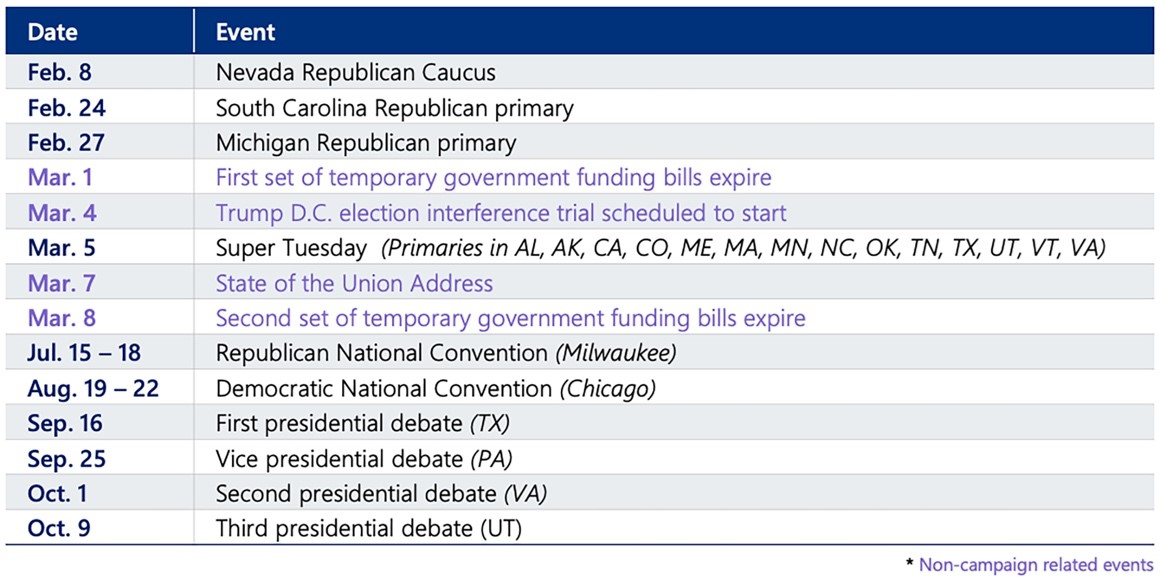
Download the report here
